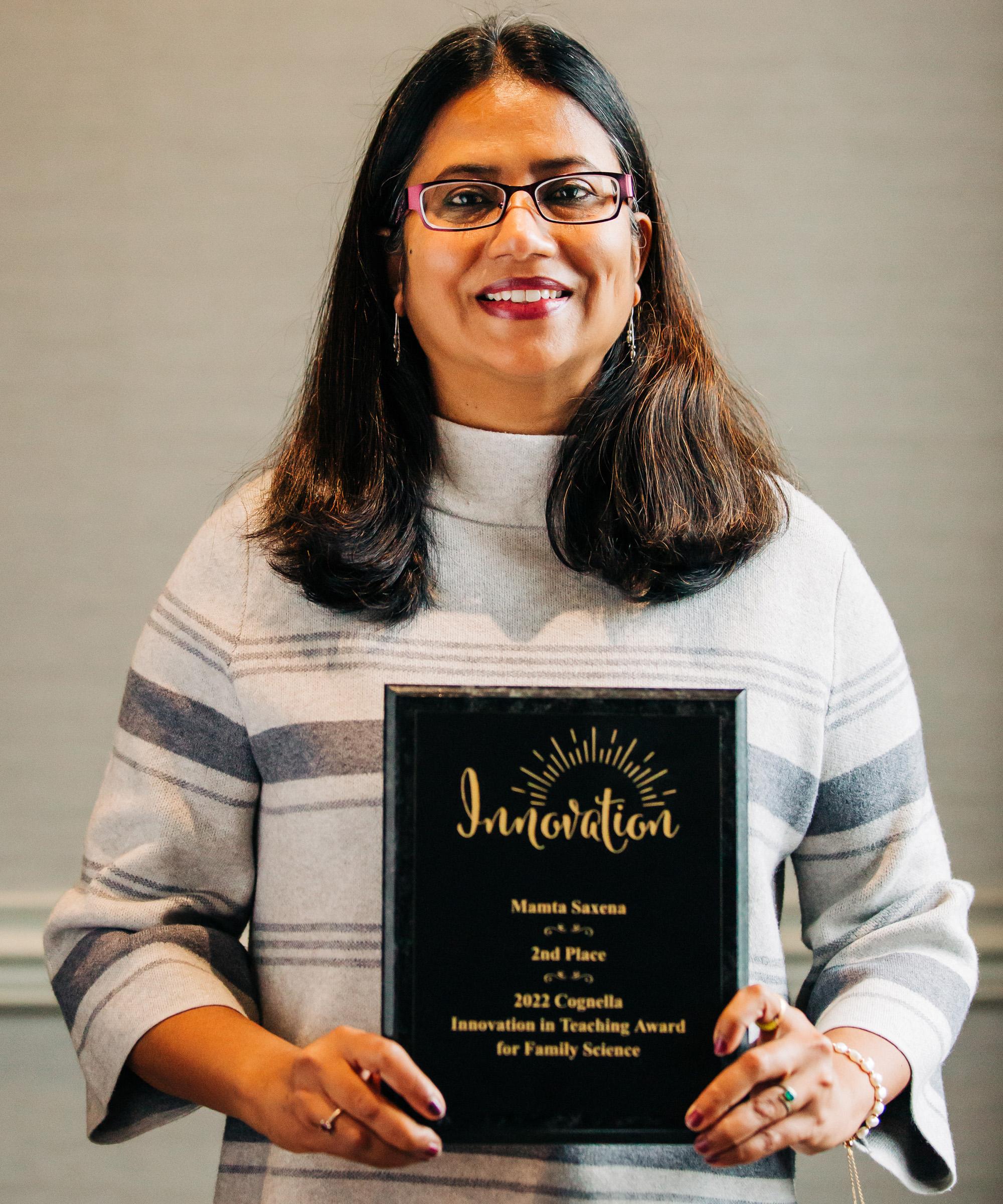Mamta Saxena of SUNY Oswego’s human development faculty has earned an award from the National Council on Family Relations (NCFR) for an outstanding combination of teaching, advising and scholarship.
The NCFR recognized Saxena with the Cognella Innovation in Teaching Award for Family Science in late 2022. NCFR noted Saxena’s innovative use of a care-based pedagogy (the method and practice of teaching) that connected instruction, scholarship, advising and community partnerships.
“I felt honored to receive this award on such an important national and international platform with professionals I revered as a graduate student,” Saxena said, also giving credit to the chair of SUNY Oswego’s Human Development Department: “Since the award acknowledged my attempts to support my students' needs and pedagogical changes, I am thankful for the leadership of Dr. Dorothy J. Shedlock, who supported and encouraged my ideas and teaching strategies.”
The award connects with work Saxena did with two human development research methods classes. The courses came at a time when the COVID-19 pandemic challenged regular teaching methods, but built on this by studying how the pandemic impacted family life, mental wellness and related issues.
NCFR judges praised Saxena’s teaching and use of four-step instructional model “integrating subject mastery, a gamified approach, authentic assessment, and content accessibility in synchronous and asynchronous courses,” they wrote in the award announcement. “Utilizing this method, Dr. Saxena’s students collected data on approximately 400 individuals to study the impact of COVID-19 on family routines, coping and stress, which yielded valuable data and also taught students best practices in survey design and data collection.”
Reflection and revision
Students in the human development major, Saxena explained, are required to complete three courses in research methods, learn about data collection and analysis, and present findings to diverse audiences.
“These courses promote scientific literacy and critical thinking and construct deeper insights into understanding developmental processes and outcomes,” Saxena said, but some students can find them “abstract and frustrating, affecting their motivation and performance.” The onset of the pandemic, with the switch to online courses, added to these challenges.
“To improve student performance and ensure their academic success, I have always reflected on my teaching processes in methods courses,” Saxena said, noting active participation in the university’s Center for Excellence in Learning and Teaching (CELT) workshops and faculty retreats, spearheaded by CELT’s director, John Kane. These sessions “reinforced some course revisions that may ensure student support and success,” Saxena said.
With this reflection and revisions, starting in fall 2020, Saxena applied a four-step instructional model that is an adapted version of the Partners in Parenting Education framework.
Saxena describes the steps as “a) the presentation of objectives of the session and details of the topic, b) the demonstration of processes, c) group or individual activities to check and practice learning, and d) discussion, evaluation, and feedback on the content. I utilized several web-based and Zoom tools for each step to complete the process online.”
Overall grades and participation in the class improved between fall 2020 and spring 2021, which “evidenced that the instructional model positively impacted student engagement and learning outcomes,” Saxena noted. “Students reported that the course was informative and enjoyed the discussions and frequent check-ins during sessions.”
To further help the profession and colleagues, Saxena published on her process and progress in the organization’s Family Science Review journal and presented a 2021 CELT workshop on her work and findings.
Founded in 1938, the NCFR is a professional organization focused solely on family research, policy, and practice. Partnering with the publishing organization Cognella in 2018, the council presents two innovation awards annually to faculty “who have introduced cutting-edge teaching practices to their courses that better engage students and advance scholarship within the discipline,” according to Cognella’s award website.




